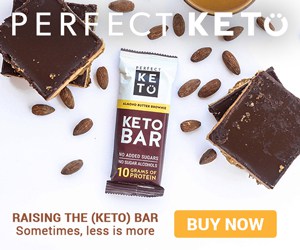How Do Keto Supplements Work? Your Complete Guide [2019]
Superman energy. An unclouded and clear mind. Easy weight loss. Sounds like a bad ad, right? But if you can stick to a Keto diet all of these things can happen.
Simply put, ketones- either endogenous (produced in the body by the liver) or exogenous (produced outside the body) – are just another source of energy that our body relies on.
Since 2014, exogenous ketones have become a popular way to induce ketosis. But there has been a lot of erroneous information about them. This article tries to show you to show you the true merits and demerits of exogenous ketones.
How do ketones supplements work? Exogenous ketones function the same as endogenous ketones. As ketones are simpler compounds, the body cannot differentiate whether a particular ketone came from a laboratory or from the liver. So if someone takes beta-hydroxybutyrate (BHB) in a drink, it should behave the same as those which are produced in the liver.
Due to that, more people are using exogenous ketones to induce ketosis. But are they legit? Are you using them properly? How do you know exogenous ketones are better for you?

How Exogenous Ketones Work
Exogenous ketones are becoming an effective means to increase the concentration of ketones in the blood and to mimic a ketogenic diet. Exogenous ketones also induce a number of physiological effects as soon as they enter the bloodstream:
Increases the amount of BHB (Beta Hydroxy Butyrate) in Blood
Just after ingestion, ketones (especially ketone esters) increase the amount of BHB in the blood to a level more than 2mMol for about 8-9 hours. However, ketone salts are not as efficient as ketone ester in increasing the level of BHB.
Decreases Blood Glucose
Exogenous ketone supplementation aids in decreasing the concentration of blood glucose levels. This can occur due to an increase in insulin sensitivity. This shows that exogenous ketones can be a potential therapy to treat diabetes type-2 where insulin sensitivity is significantly decreased
Increases Oxygen Utilization by Brain
Toxic levels of oxygen can lead to the formation of free radicals which can decrease the brain’s ability to perform optimally. Exogenous ketones, either taken orally or through IV infusions, can dramatically increase the oxygen utilization of the brain.
This can help the brain to steer clear of the toxic effects of excess oxygen deposition. It has been found that up to 60% of the brains energy can be met by ketones. This is why everyone is able to naturally produce and burn ketones.
It’s interesting when you look back into the evolutionary biology- the enzymes involved with ketone metabolism start to appear when our brains started to get larger and efficient. It’s not just something that’s common in human brains, it’s just as common as in our dairy cattle and also really common in baby rodents.
As their brains are in still in the developmental phase and are really precious, demanding a lot of energy, these organisms have a very strong ability to produce and burn ketone bodies. This shows that ketones are not unnatural substances and that’s the very reason the mother’s milk is high in fats- so that babies can remain in nutritional ketosis.
Decreases the Number of Free Fatty Acids (FFA)
Endogenous ketosis is characterized by a decrease in blood glucose but a significant increase in FFA (free fatty acids). Exogenous ketones, on the other hand, act to decrease the amount of glucose as well as FFA. When exogenous ketone supplementation is started; they stop adipose tissue lipolysis through feedback mechanism- βHB-mediated agonism of the PUMA-G receptor in adipose tissue- making the co-existence of low FFA and glucose and high βHB possible.
Check Out These Exogenous Ketone Products:
Can Exogenous Ketones Produce more ATPs than Glucose?
Simply put, ATP is the measure of energy a cell has (the energy currency of a cell) which is either derived per oxygen or per carbon atom. While glucose is better at producing more ATPs per oxygen, ketones are known to release more ATPs per carbon. So naturally, it’s just nip and tuck. What makes ketones preferable to glucose is the efficiency of energy stored in each ATP. While ketones may not be able to release more ATP molecules than glucose, they are better at producing more efficient forms of ATP.
Where ketones provide an advantage is through the energy stored in each ATP. There’s not necessarily more ATPs being produced, but more efficient and potential ATP being produced.
Ketones are just another source of energy that our bodies rely on and it might be seen as an opposite of glucose. So if someone goes on eating just a normal diet, are they relying on ketones and not just on glucose for energy? Yes is a humbler answer.
Normally after an overnight fast, a person who just consumes a normal diet might have a very low amount of glucose in their body. This means that these people have ketones in their blood and they are able to use them as an efficient way to run their bodies.
There’s still a lot of work to be done because until now when exogenous ketones are more readily available, the only way to study this in humans was to do by fasting.
Why use Exogenous Ketones?
High fat, low carb diet is not for everyone. Eventually, people get kicked out of ketosis due to too many restrictions. But that’s where exogenous ketones come in. You can use them to achieve your goal of getting into ketosis. Some of the benefits of exogenous ketones include- increased weight loss, enhanced athletic performance, and improved cognition, anti-inflammatory effects, and cancer prevention.
Efficient Weight Loss
Ketones help achieve your fitness goals in a much shorter span of time. This occurs in three ways:
Appetite Suppression
The appetite suppressing effects of exogenous ketones are well-documented and science-backed. In one study, the scientists measured appetite in 5 females and 10 males who consumed either a dextrose drink or a ketone ester. The perception of hunger dropped in the participants after both dextrose and ketone drinks. However, the effects of ketone ester were found to be 50% higher than dextrose for up to 4 hours.
Both drinks caused a spike in the insulin levels but the insulin levels were 3x lesser in participants who consumed the ketone ester. Consumption of ketone ester also lowered the levels of ghrelin, the hunger hormone, for 2-4 hours. The study concluded that exogenous ketones can reduce appetite and slow down the onset of hunger, ultimately leading to weight loss.
High Tolerability
There are a lot of weight loss supplements on the market claiming to provide the same weight loss benefits as offered by exogenous ketones. So what makes exogenous ketone supplements different? It’s highly tolerability.
MCT oil and other weight loss supplements are known to induce gastrointestinal distress, especially when consumed in higher quantities. Exogenous ketones, especially in salt form, are much more tolerable. These exogenous supplements enable you to enjoy the same weight loss benefits without suffering from adverse gastrointestinal events.
Performance Goals
Training harder, performing longer, and recovering faster are the three main goals of every athlete; and ketone supplements make sure that you achieve them as easily as possible.
Consuming ketones as a dietary supplement has been explored as a means to improve athletic performance. The primary idea behind this is to provide your muscles with an alternative fuel which is easily accessible.
Exogenous ketone supplements act by enhancing two important components: fuel sparing mechanisms and energy efficiency. This area holds a positive outlook for a number of causes:
- Exogenous ketones prompt ketosis that can last for a couple of hours. This effect is accomplished without the need to deplete muscle glycogen stores. A low level of muscle glycogen is a well-known factor that hinders the sustenance of a physical performance. Because exogenous ketone supplements bypass this effect, they can improve the athletic performance much more efficiently.
- The ‘carb-sparing’ effect of the ketone supplements can suppress the breakdown of muscle glycogen, leading to a decrease in the lactate levels. As the increasing intensity of exercise and fat oxidation reach a limit, your muscles tend to burn carbohydrates to derive energy. However, when you are consuming ketone supplements, your body skip making this switch, suggesting that it is using ketones instead.
- Taking exogenous ketone supplements causes your body to depend less on fat as fuel. As compared to muscle glycogen, fat takes more time to metabolize for energy. Due to this, fatty acids are not preferred as fuel to derive energy during heavy exercise. So using ketone supplements can be useful for the keto-adapted athletes performing strength training or high-intensity cardiovascular exercises.
- Consuming exogenous ketone esters increase the levels of free carnitine during exercise. The increase in the levels of free carnitine, in turn, improves physical endurance.
- Using exogenous ketone supplements can decrease the utilization of branched-chain amino acids (BCAAs) as fuel. These supplements can also reduce the rise in the levels of muscle BCAAs by 50 percent during exercise, as per a research.
Cognitive Improvement
Using ketone supplements gradually increase the concentration of ketones in plasma. This diverts your brain to use these ketone bodies for synthesizing phospholipids which, in turn, controls growth and myelination of nerves.
In normal circumstances, glucose is the preferred substrate for this purpose but because of a higher efficiency, ketone bodies can accomplish this much more easily.
Ketone bodies also act as a signal for multiple neuronal pathways. They can enhance cognition, improve synaptic plasticity, and boost neuronal stress resistance. Ingestion of a ketone ester for 5 days continuously has also been associated with an improvement in the memory and spatial learning.
Anti-carcinogenic Effect
Scientific evidence seems to suggest that exogenous ketones supplements possess strong anti-carcinogenic properties. The reason behind this is that unlike the healthy cells of your body, the cancer cells do not have the ability to use ketone bodies effectively
Exogenous ketone supplementation has, therefore, been shown to improve the survival rate of systemic cancer by as much as 70 percent.
Neuro-protection
As humans age, their brains become more susceptible to neurodegeneration and related problems such as Parkinsonism and Alzheimer’s disease. Supplementation with exogenous ketones tends to ameliorate this much-anticipated decline in the cognitive function that usually accompanies the process of aging.
The most likely mechanism of neuroprotection provided by ketone supplements is that the ketone bodies decrease inflammation and hyper-excitability which normally takes place as the glucose metabolism declines within the brain.
Anti-inflammatory Effects
Evidence suggests that supplementation with ketone bodies can drastically reduce inflammation in your body. The likely mechanism of action includes the direct inhibition of a specific class of proteins known as the inflammasomes.
Additionally, using exogenous ketones can also relieve pain by:
- Decreasing the activity of the nervous system, which consequently improves pain perception.
- Decreasing the levels of reactive oxygen species, which primarily contribute to inflammation.
- Increasing the levels of adenosine, a natural chemical known to combat inflammation and exert pain-relieving effects.
What happens to extra ketones?
If you have high blood levels of ketones, your body, particularly the renal system, starts working to filter them out as soon as possible instead of converting them into adipose tissue.
This means that ketone bodies are less likely to be stored in the body in the form of fat as compared to other nutrients. Consuming exogenous ketones can, therefore, help you achieve a slimmer and healthier body at a much faster pace.
Dangers of Exogenous Ketones
Like any other nutritional supplement, the downsides and side effects are possible following the consumption of exogenous ketones. This means that most of the side effects are benign and are most likely to improve as the body starts getting used to ketone supplementation. Some of the most common side effects to keep in mind while using exogenous ketones consist of:
Hypoglycemia
Using ketone supplements can reduce your blood glucose levels to a great extent. However, you are not likely to experience the typical symptoms of hypoglycemia. This is because the levels of ketones in your body are fairly high and they are dominating as fuel for your brain. Hence, you will feel fine despite having low blood sugar.
Imbalance of Electrolytes
The key reason behind electrolyte depletion during the state of ketosis is frequent urination and a lack of water retention. As you are supplementing your body with exogenous ketones, the immediate state of ketosis increases the rate of urination but does not affect glycogen stores.
Hence, it is often useful to consume an electrolyte solution if you feel like you are urinating more frequently following the consumption of exogenous ketones.
Flatulence (At High Doses)
Exogenous ketones taken in large quantities may sometimes lead to gastrointestinal stress, particularly flatulence. However, if you are careful enough about the moderation of the dose, the likelihood of this problem is rather low. Additionally, this problem is likely to improve as your body becomes accustomed to taking ketone supplements.
Halitosis
If you have ever been on a ketogenic diet, you probably know that as your body starts metabolizing fat to release ketones, these ketones may lead to poor breath or halitosis. There is not much one can do about this except being patient.
Unfortunately, the same effect can arise while using exogenous ketones. However, it is not as long lasting as when you are on a ketogenic diet. The best option to get this problem under control is the use of mints or chewing gums.
Caution Using Exogenous Ketones
Exogenous ketones can be a great tool for those who are wishing to start a ketogenic diet. There can be times when following a strict protocol of ketogenic diet is not possible and that’s where exogenous ketones come in handy. Supplementing the body with these products will signal the body to start ketosis. But, there are situations where their use is contraindicated.
High carbohydrate diet
Our body is programmed to use glucose as the primary source of energy. If you are on a high carbohydrate diet, your body would be burning glucose for energy. This means that ketones and fats would be urinated away as they are not being used up.
Using exogenous ketones under such circumstances hurt your wallet and will not be useful in accomplishing your goals. Exogenous ketone supplementation would not save you from your favorite cakes and cookies as they will not undo the effects of a diet full of carbohydrates.
Start slowly
Starting ketones at high doses will also prove useless for your goals. The term ‘disaster pants’ is used for those who get into ketosis by starting with a high dose of MCT oil. If you start with too high a dose or continue taking exogenous ketones with high carbohydrate diet, chances are you would feel the side effects- nausea, feeling poorly, and heavy breathing. If used properly, they can get absorbed through your stomach, metabolized in the liver and then used by the rest of your body.
Appetite suppression
Exogenous ketones have a side effect of reducing appetite. Although this might seem appropriate for those who are looking for a quicker weight loss, they should know the difference between fasting and starving.
One should always pay attention to the cues the body is giving as fasting longer than required can cause serious complications. Don’t get tempted to the appetite suppression side effect of exogenous ketones and make sure to maintain a proper supply of nutrients to maintain your activities and preserve a good muscle mass.
Diabetics
People who are suffering from diabetes and unregulated blood sugar should always consult with their trusted physician before they start with exogenous ketones. Although many types of research have proven exogenous ketone supplementation to control blood sugar, there might be a risk of blood sugar dropping quickly. People have been using a well-formulated ketogenic diet plan to control their diabetes, but close monitoring is always the key to a better outcome.
Ketone Breath
Individuals starting on ketogenic diet plan can experience a side effect called as ketone breath. It can appear with intake of exogenous ketones too and might feel unpleasant, but there’s nothing to worry about it. Ketone breath is temporary and is harmless as it’s simply due to the accumulation of acetone in the body. One can get rid of it by chewing gums that are low in carbohydrates.
Misleading products with the word “ketones” or “keto”
There might be products in the market that market themselves as weight loss magic pills or supplements. Be aware of them as their functioning is nowhere near exogenous ketones. These products might lure individuals to help them maintain ketosis, but in reality, they are nothing but a scam.
The most common example is the raspberry ketones supplement. This supplement was first made known to the public by Dr. Oz after which researchers started studying it in detail.
Raspberry ketones are totally distinct from endogenous or exogenous ketones and don’t function in the way described above. These supplements just reduce appetite and, in the long run, are unable to reduce weight significantly. Raspberry ketones, naturally found in raspberries, are the ones that give them their odor and flavor. However, those available commercially don’t necessarily come from raspberries.
When and How to Use Exogenous Ketones
Kickstart your morning with a ketone drink or gulp down a scoop before a lazy afternoon meeting- you can take these supplements whenever you feel the need. But you need to make sure that you are not exceeding the daily limit.
Most nutritionists recommend consuming no more than two scoops of ketone supplements per day. Exceeding this limit makes you nauseated as your body struggles to take care of the excess quantities.
As mentioned before, you can consume ketone supplements whenever you feel like it. However, getting the best of these supplements requires consuming them at an appropriate time. The following tips will help you decide the best time to take ketone supplements according to the intended purpose.
Brain Defogger
Take no more than one scoop of exogenous ketones in the morning to provide your mind with clarity for the rest of the day. You can add them to smoothies, juices, or simply to 8 ounces of water early in the morning.
Before exercising
Don’t forget to take a scoop of exogenous ketones just before you start working out. You may add it to a glass of water and drink 30 minutes before an exercise session. If you are up for resistance training, take half a scoop of this supplement after every hour of training.
Stopping the Keto Flu
Keto flu is a side effect commonly encountered by people following a keto diet. Luckily, exogenous ketone supplements are there to save the day. To avoid keto flu, take a spoon full of exogenous ketones twice a day: once in the morning and once in the evening.
This will make sure to correct any electrolyte deficit and get rid of the discomforting symptoms of the keto flu.
After exercising
Intense workouts can often cause depletion of ketones and electrolytes. To avoid this, take out a scoop of your preferred ketone supplement and use it to prepare a tasty post-workout drink.
Getting into Ketosis
Add your favorite exogenous ketones to a glass of water, lemonade, or coffee to induce ketosis at a much faster rate. If you are already following a ketogenic diet, exogenous ketones can help you achieve this metabolic change even faster. If the purpose of using ketone supplements is to increase mental focus, prefer taking it on an empty stomach.
Future of Exogenous Ketones Research
The health benefits of ketones are not limited to weight loss and a clear mind only. Most of the work by researchers is now being focused to increase the quality of life and to promote a longer life. Dominic D’Agostino’s current work has now focused much of his researches on ways exogenous ketones can prevent cancer.
Psychological uses of exogenous ketones are being studies in detail nowadays. It is believed that these chemicals can help protect the brain tissues and can prevent illnesses like Parkinson’s disease, epilepsy, and even Alzheimer’s disease.
Expectantly, the major part of research on exogenous ketones will focus more on increasing the performance of the athletes in the coming future. As the data is very limited in this area, scientists are now getting more and more involved in ways to increase the efficiency of the cardiovascular system of those undergoing resistance training.
Diabetes type-2 has now officially reached to epidemic proportions through the world. Exogenous ketones have shown to be promising in reducing the blood sugar levels. The future can be bright for those affected with diabetes type-2 taking exogenous ketones, but still more research is to be conducted.
Takeaways
Exogenous ketones are becoming the center of attraction. They are being considered as the main way of prevention and treatment for many fields (longevity, neurology, weight loss, physical performance etc.). Although people have taken notice to dump carbohydrates and start a ketogenic lifestyle, still more data is required to ensure proper long-term effects.
Ketone esters considered one of the most important means to achieve ketosis in the body without following a ketogenic diet. But their intake must be maintained at regular intervals to maintain healthy and continued ketosis. If someone is living in areas where there are plentiful ketones, he/she should prefer to increase their intake, especially during hours of exercise. Even in high glycolytic activities (e.g., sprinting) ketones, whether exogenous or endogenous, have shown favorable results.
Exogenous ketones are now being considered as a means to reduce/prevent diabetes type-2. At this point, it may be early to say that ketones are a powerful tool in preventing cancer, but research is underway and impressive results are soon to come in the coming years.
Research suggests that exogenous ketones can aid those who already strictly follow the keto diet. This sums up one thing: these aren’t a quick-fix-solution. Although people are naturally drawn towards a quick and easy fix, they should keep in mind that it’s not a silver bullet or a fix-it-all product. If someone is looking for weight loss, they’ll have to put the effort in and follow the ketogenic diet too along with taking exogenous ketones. Taking these will not turn your body on autopilot towards a slim and smart body.
Related Questions
Should I start using exogenous ketones?
Maybe yes, maybe no. The answer depends entirely on what your goals are. If you are already following a strict keto diet, chances are you won’t require exogenous ketones. However, there might be cases where you require high mental performance and your diet isn’t giving you one. Well, that’s where exogenous ketones might come in handy for you. Simply stated, exogenous ketones are not a risky thing to use. Simply give them a try and see how well they suit you.
Will exogenous ketones stop me from fasting?
No. As stated earlier, our bodies are unable to differentiate between endogenous and exogenous ketones. So as long as you are taking a good quality product that doesn’t come with other garbage, your body will remain in fasting state. In fact, one of the main reasons fasting is proven to be effective is due to the ketones- the reserve machinery for energy production.
Can my body store excess exogenous ketones as body fat?
No, our body is unable to store ketones. Be it endogenous or exogenous ketones, your body will try to make sure that each and every last molecule of the ketone is burned for energy. Still, if there’s an excess of them, they will be excreted out of the body in urine.
Can my body get adapted to exogenous ketones to a point that it no longer produces endogenous ones?
No, this can never happen. No matter how many exogenous ketones you take, your body will never stop making endogenous ketones.
Can I take exogenous ketones during pregnancy?
If you are pregnant or are suffering from a serious illness, you have to consult your doctor first before taking any exogenous ketone supplementation.

![How Do Keto Supplements Work? Your Complete Guide [2019]](https://shortcutketo.com/wp-content/uploads/2018/11/How-Do-Keto-Supplements-Work-small.jpg)






